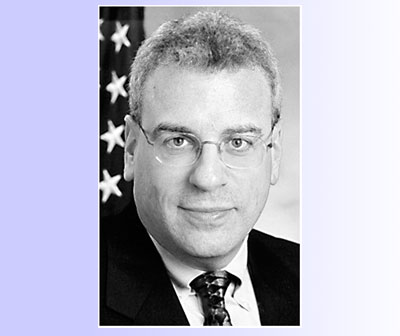By: Jeffrey Dinowitz, Member of Assembly
|
|
|
|
 Jeffrey Dinowitz
Jeffrey Dinowitz
|
'In the Assembly you need to be present to vote nay, but not aye. This is referred to as empty seat
voting. There is no doubt then that the Legislature is in need of reform. Twenty years of late budgets
and political gridlock have left many legislators frustrated with how Albany operates.'
|
|
|
|
|
|
|
t 3 a.m. on the last day of the 2003 legislative session, the State Assembly voted 78-68 in favor of legislation to
alienate 48 acres of Van Cortlandt Park to make way for the city's proposed water filtration plant. I led the floor
debate against the bill which the other 10 Bronx Assembly members supported.
Seventy-six votes were necessary to pass the bill, but fewer than 60 supporters of the measure were actually in the
Assembly Chamber. Several members who "voted" in favor of the bill were not in the building at all.
In other words, there were more nays present than ayes, but the bill passed anyway. How could this be? In the Assembly,
you need to be present to vote nay, but not aye. This is referred to as empty seat voting.
This vote, which obviously hit home more than most, was one of the reasons I became convinced of the need for some
major reforms in Albany.
There is no doubt then that the Legislature is in need of reform. Twenty years of late budgets and political gridlock have
left many legislators frustrated with how Albany operates. Last week I joined 16 of my Assembly majority colleagues in
introducing a resolution to change the rules. I believe that this is a significant legislative reform measure.
By introducing the proposal as a resolution, my colleagues and I are hopeful that we can move real reform forward, since
a resolution does not require the approval of both the Senate and the Governor and can be adopted as soon as it passes
the Assembly.
The proposal is based on the major recommendations of the Brennan Center for Justice in its landmark report, The New
York State Legislative Process: An Evaluation and Blueprint for Reform. The resolution's key provisions would:
-
Give each Committee the power to hire and fire its own staff. Currently, that authority resides with the Speaker.
Making staff less beholden to leadership will allow them to be more responsive to committee chairs and the
needs of their policy area.
This would result in stronger, more independent committees that would be better equipped to analyze legislation,
move good bills forward, and take an active role in shaping policy within the committee's policy area.
-
Require all floor votes to be "slow roll call" votes, whereby members' votes would be counted only
when members are present in the chamber and personally indicate whether they wish to vote "aye"
or "nay." Insuring that all of the members are present for votes makes it more likely that bills will be
debated and that members will more fully consider each of their votes. There would probably be fewer one house
bills in the Assembly.
-
Require a public hearing upon the petition of one-quarter of a committee's members, unless the petition is
rejected by a majority vote of the committee. Currently, less than 1 percent of the major legislation that is passed
in the Legislature is the subject of public hearings.
By making it easier to hold public hearings it is hoped that there will be more public discussion and input on the
many important bills that the legislature considers each year, making it easier to make more informed decisions.
-
Require a two-thirds vote of the Assembly to accept a "Message of Necessity" from the governor, a
parliamentary tool that is used to force votes without giving legislators time to read the bills. This would turn the
message of necessity from a tool of late night deals, to a tool of actual necessity. While no one would argue that
there are situations in which action cannot wait three days for a bill to age before approval, it would be hard to
argue that the large proportion of our bills currently passed using a "message of necessity"
must be passed at 3:30 in the morning.
-
Make Motions to Discharge a viable tool to release bills from committee gridlock. As much as I disagree with
many of the bills that are proposed in the Assembly, I do not believe that they are all properly considered. Now,
all the bills that reach the floor for debate or consideration are passed. While the motion to discharge would still
require a majority, it would be easier for bills that have a large number of sponsors but do not have the support
of leadership to be considered.
-
Make attendance at committee meetings mandatory. As legislators, one of our most fundamental duties is to
consider proposed legislation. However, all too often some members of the Assembly choose not to attend
committee meetings, which are vital to the legislative process.
The failures in Albany this year involved the Assembly, the Senate and the Governor. Albany didn't fix the school
funding mess; it didn't raise the minimum wage or reform the Rockefeller Drug Laws; and the budget was late yet again.
We can make real change if enough of our colleagues join us in our efforts to initiate true reform in Albany.
Jeffrey Dinowitz represents the Riverdale Kingsbridge area in the New York state Assembly.
Point of view is an occasional column open to all readers.
|


